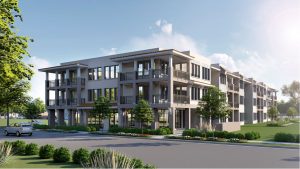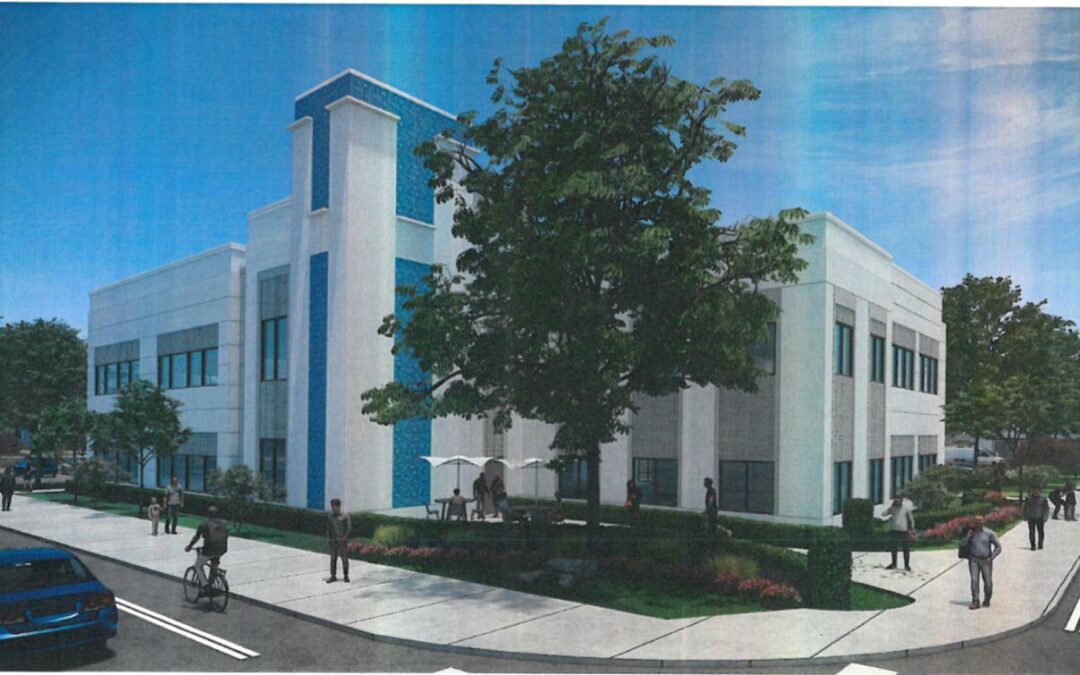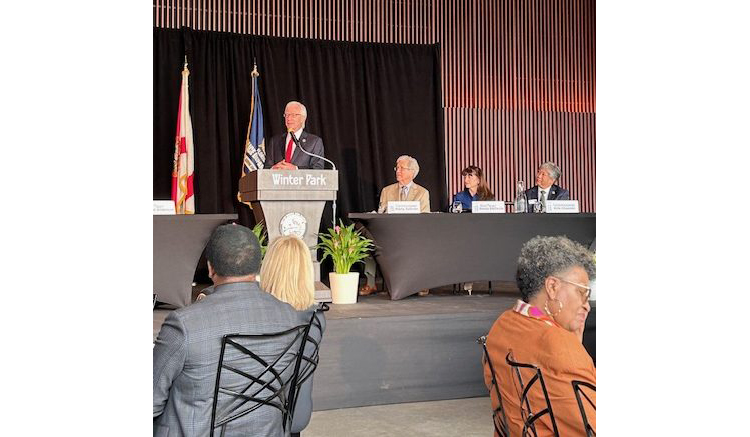
by Beth Kassab | Aug 23, 2024 | City Commission, News, Uncategorized, Zoning and Development
Rollins proposes payment equivalent to some taxes on faculty apartments
The liberal arts college is often exempt from property taxes as a nonprofit educational institution. The agreement now before the City Commission would be a first for the city.
Aug. 23, 2024
By Beth Kassab
In a first-of-a-kind deal for Winter Park, Rollins College is proposing it pay a fee equal to a portion of the city property taxes it would owe on a faculty housing project up for City Commission approval next week.
The potential agreement comes after months of back-and-forth with city officials and residents over the liberal arts college first unveiled plans to build 48 apartments on land it already owns at Welbourne and Virginia avenues.
College administrators say the apartments, which would be rented to faculty and staff below market rate, will serve as a recruiting tool for early-career professors who would otherwise likely live much farther from campus as a result of the high cost of rent in Winter Park, where homes routinely sell for more than $1 million.
But criticism over the architecture of the project, lack of commercial space on a portion that once fronted New England Avenue, parking concerns and the college’s typical exemption from property taxes contributed to major revisions of the plans.
The project now contains 30 units vs. 48, a pocket park, additional parking and no longer includes a building fronting New England Avenue.
In what appears to be an effort to satisfy calls from the Planning & Zoning Board to contribute to funds for city services, the college says it will enter into a Payment in Lieu of Taxes or PILOT agreement with Winter Park if the typical exemption for nonprofit educational institutions is granted on the land.
The payment would equal about 50% of the taxes owed to the city or about 2 mills. Rollins estimated the payment at between $18,000 to $20,000 a year, though an exact figure won’t be available until it is built and assessessed by the Orange County Property Appraiser.
“The PILOT payment is intended to offset the costs of emergency services for the multi-unit residential project,” the college said in the language it submitted to the city.
“Currently, we have 14 units on the site, and we pay no taxes,” said college spokeswoman Jo Marie Hebeler. “So this is a significant commitment and contribution from Rollins.”
Rollins uses an older building on the site for graduate student housing, but that would be torn down as part of the new project.
The private college, known for its lakefront Spanish-Mediterranean campus and tuition and fees totaling more than $76,000 a year, had resisted such an agreement in previous meeting, citing what it said was already significant contributions toward city services such as allowing the police and fire departments to use old buildings for training and argued such a deal would set a bad precedent.
Much of Rollins’ property holdings in the city are exempt from the tax rolls and some residents have voiced concerns that the college is growing too far outside of its main campus and should contribute more toward the cost of development.
The college does pay taxes on some of its land that doesn’t qualify as exempt such as on The Alfond Inn, a luxury hotel it runs as a for-profit business. The college owes $767,000 in taxes this year on the inn, which is assessed at nearly $50 million, according to property appraiser records.
Jeff Briggs, the city’s longtime planning director, said this is the first time a nonprofit group has reached a PILOT agreement with the city. The deal will likely be closely watched by other nonprofits across the region including hospitals such as AdventHealth and Orlando Health and other colleges and universities.
The City Commission will take up the project at its meeting on Wednesday, Aug. 28.
WinterParkVoiceEditor@gmail.com
To comment or read comments from others, click here →

by Beth Kassab | Aug 10, 2024 | City Commission, News, Zoning and Development
Rollins wins P&Z recommendation for apartments -- with conditions
The board is pushing the City Commission to require the college pay a fee in lieu of taxes because it is exempt as a nonprofit educational institution
Aug. 10, 2024
By Beth Kassab
In what is certain to be a closely-watched case among nonprofit institutions across Central Florida, pressure continues to mount for Rollins College to cover some costs of city services related to its latest development proposal.
The Planning and Zoning board voted unanimously last week to recommend the City Commission approve the 30-unit, 2-and-3 story project on the corner of Welbourne and Virginia avenues, but only with multiple conditions attached including a pilot program that calls for the small private liberal arts college to pay fees in lieu of taxes.
Rollins, which charges about $76,000 a year in tuition, housing and food costs, according to its website, qualifies for a tax exemption on much of its property as a nonprofit educational institution, meaning that it doesn’t pay typical ad valorem taxes on its assessed land values, other fees or sales taxes.
But increasingly vocal residents in Winter Park are crying foul — arguing that Rollins should pay more of its share for basic services like police and fire rescue, flood control, roads and parks.
Dykes Everett, a local business owner, was just one of a handful of people who attended the meeting to encourage the board to push for a special payment program.
“I’m here in support of holding the line on a fee in lieu of taxes,” Everett said. “A private citizen would have to pay for police and fire … The impact is real and it’s just the same as every other citizen would have.”
Rollins attorney Rebecca Wilson argued against such a requirement for a payment.
“At this time, the college is not willing to agree to that,” Wilson said, noting Rollins pays more than $1.1 million in taxes on its unexempt property and partners with the police and fire departments to allow them to run drills in empty buildings on campus. “We believe Rollins has been a great partner to the city.”
The project, which has undergone a series of architectural revisions and is now smaller than originally proposed last year, is intended to provide below market rate housing for faculty and staff in a city with soaring home prices and to help the college recruit new hires.
She also said she isn’t aware that the city has asked any other nonprofits to make such payments.
Among the largest of those would be AdventHealth Winter Park, which operates a growing nonprofit hospital and its one of the city’s largest employers.
A Rollins spokeswoman suggested Rollins may reconsider such an agreement, but did not respond to a follow-up question from the Voice asking for details.
“We are working internally to accommodate the full motion approved by P&Z,” said Jo Marie Hebler, a Rollins spokeswoman. “We expect to have a mutually beneficial plan that will be on the Aug. 28 City Commission agenda.”
City Planning Director Emeritus Jeff Briggs said he was unaware of the details of such a plan.
The City Commission has the option of accepting the P&Z board’s recommendations in total or in part or of rejecting the proposal all together.
The recommendation for approval by Warren Lindsey includes the following conditions:
- The apartments will be built with 60 parking spaces.
- No student housing or classroom instruction space is allowed.
- Rollins agrees to own and operate the faculty and staff housing for 30 years.
- If Rollins wants to amend the agreement it must wait at least five years and the change must go through the P&Z process.
- If Rollins receives a state tax exemption on the property it must enter a pilot program with the city to pay the equivalent of city taxes and stormwater fees.
Members Jason Johnson, Bill Segal, Michael Spencer, Jim Fitch, Alex Stringfellow and David Bornstein all voted in favor.
WinterParkVoiceEditor@gmail.com
To comment or read comments from others, click here →

by Beth Kassab | Aug 9, 2024 | City Commission, Library, News, Uncategorized, Zoning and Development
Old library undergoing rezoning for Blue Bamboo
The performing arts center’s director said construction could begin as soon as November
Aug. 9, 2024
By Zoey Thomas
Blue Bamboo Center for the Arts is a step closer to opening in the old Winter Park Public Library building.
Planning and Zoning board members approved changing the property’s classification from residential to PQP, or “public, quasi-public,” at a meeting on Aug. 6. The City Commission already voiced their approval of the change and is scheduled to formally vote on the matter on Wednesday.
“Functionally, it’s kind of a box check,” said Alex Stringfellow, a Planning and Zoning board member, at the meeting.
In order for Blue Bamboo to function as a public property, the board also had to approve changing the definition of a PQP itself to include “performance art venues together with ancillary gallery, educational, rehearsal, recording studios and offices to support the like, within a city- owned building.”
All members voted in favor of the changes except Bill Segal, who said he voted against it for “technical” reasons — he didn’t appreciate the way the issue came before the board, he said.
The zoning change will come back to city commissioners for final approval and public comment before Blue Bamboo can submit its official drawings for the building and get things “up and running,” said Chris Cortez, the center’s director.
Cortez told the Voice he feels confident the final steps will go “according to plan.” Two commissioners would have to flip their votes to block the zoning change from passing, which he said he doesn’t anticipate.
“No one has expressed to me that we’ve lost any of their support for this project,” he said. “There is a long shot chance that everything could change, and we would all feel like we wasted a lot of time, but it doesn’t seem very likely.”
Rather than losing support, Cortez said the monthslong process of winning the building over Rollins College, hammering out the lease and navigating zoning changes has only drawn more support from the community.
That includes from sponsors who have reached out to Cortez about offering the center money in exchange for advertisements and promotion, he said.
If the zoning vote at the City Commission on Wednesday turns out in Blue Bamboo’s favor, Cortez predicts construction will begin in November at the earliest.
Commissioners were initially hesitant to take away the property’s residential zoning classification for fear of setting a precedent that could upset people living in the area.
One person, Jess Bailes, spoke against the change at the planning and zoning meeting. He said his neighborhood near the library building already faces traffic and parking issues stemming from the Alfond Inn, which will only be made worse once Blue Bamboo, which he called was “almost a bar,” opens.
As the executive vice president of ABC Fine Wine & Spirits, the Florida-based alcohol chain store that originally opened as a bar, Bailes said he understood the problems that could be caused by serving liquor.
“I had a hundred bars at one point, and we have zero now for a reason,” he said.
Cortez said he wants to be a “good neighbor” to residents living near the building. He hopes to look into options to reduce traffic flow, including offering discounts to visitors who use ride share platforms like Lyft or letting Alfond Inn use his parking lot for overflow parking during Blue Bamboo’s off hours, he said.
“I really want to be given an opportunity to be a man of my word,” he said. “I say I’m going to address parking concerns and traffic, I really intend to do that. So I’m going to have to get in there and prove myself to these people.”
WinterParkVoiceEditor@gmail.com
To comment or read comments from others, click here →

by Beth Kassab | Aug 3, 2024 | City Commission, News, Orange Avenue Overlay, Uncategorized, Zoning and Development
Rollins faculty housing proposal returns with big changes
The apartment building and other projects such as a retail and restaurant development along Fairbanks and zoning for the new Blue Bamboo to be considered at upcoming P&Z meeting
Aug. 2, 2024
By Beth Kassab
Rollins College is back with a new version of its plan to build a downtown apartment building designed to give faculty and staff an affordable option in a city where the median home price was nearly $600,000 in June.
The revised proposal, which will be considered at Tuesday’s Planning & Zoning Board meeting, includes a new look as well as additional conditions for the 45,842-square-foot project with 30 units.
Also new: signals of a potentially warmer reception to the concept by some residents of the nearby Douglas Grand Condominium building who previously panned the architecture and, along with some City Commissioners, called the project incompatible with the neighborhood.
“Attendees praised the new appearance,” reads a summary of a meeting this summer between college representatives and Douglas Grand owners.
Though some condo residents continued to offer suggestions such as adding real or etched stone along with the textured stucco on the building’s facade to enhance the Mediterranean architectural theme.
Rollins “already made significant and costly revisions and does not intend to revise the architecture again,” college representatives noted in the same document included in the meeting materials.
The college also addressed calls from the community to opt out of its property tax exemption as a nonprofit educational institution and contribute to city funds to help cover the cost of police, fire and other services.
“It should also be pointed out that Rollins pays approximately $1.2 million annually property taxes,” according to the summary of the meeting with Douglas Grand residents submitted by Rollins. “In addition, for the demographic occupying the units, it is unlikely there will be an excessive or frequent burden on police or fire departments.”

An earlier rendering of the Rollins faculty housing project shows how the design as changed in comparison with the latest rendering shown at the top of the page.
There does appear to be new consensus, however, when it comes to another sticking point: parking.
According to a staff report as well as the summary of the meeting with condo residents, there is support for an option that would require Rollins to provide 58 parking spaces for the 30 units rather than the code-mandated 75 spaces. One of the conditions of the agreement is that Rollins will provide a 5-foot easement along West Welbourne Avenue for the city to create more on-street parking.
“This takes into account the available on-street parking and the additional on-street parking previously discussed,” according to the staff report, noting the option also allows for the creation of a “pocket park” with additional landscaping and tree canopy at the corner of Welborne and Virginia to enhance the appeal of the project for neighbors.
Other conditions include:
- Rollins will prohibit student housing and classroom instruction in the building and commit to using the land for faculty and staff housing for 30 years.
- Units will be leased for a minimum of 6-months and only plants and patio furniture are allowed on balconies.
- Rollins and the city will coordinate undergrounding nearby powerlines and there will be some kind of solar power installation on the roof.
New retail and restaurant space on Fairbanks
The P&Z Board on Tuesday will also consider a request to build a 26,210-square-foot building for retail shops and restaurants at the corner of West Fairbanks Avenue and Capen Avenue.
The agreement is significant for multiple properties, owned by companies controlled by the Holler family and once involved in a lawsuit against the city over zoning rules brought by changes to the Orange Avenue Overlay.
Plans call for a one-story development and 106 parking spaces on the lots at 805, 801, 771 W. Fairbanks Ave. and 555 S. Capen Ave.
The development would not only improve those lots, but would provide a new future turn lane at Fairbanks Avenue and Denning Drive, land for a flood control project and allow the city to purchase a residential lot for $250,000 that could be used to build affordable housing.

A rendering shows what the development at Fairbanks Avenue and Denning Drive could look like.
City staff is recommending the board approve the conditions for the development, including that the owners landscape and maintain a 10-foot land donation on the north side of West Fairbanks Avenue until a turn lane can be constructed there to improve traffic flow. In addition, the property owner will donate three vacant lots on Comstock Avenue for stormwater retention and to help with flood control near MLK Park and Lake Midget and sell a vacant residential lot to the city for $250,000.
In exchange, the city will waive transportation impact fees for the owner on some additional properties, including 860 W. Fairbanks, the former Orlando RV dealership.
Blue Bamboo zoning change
The City Commission approved a lease earlier this summer for Blue Bamboo Center for the Arts to take over the old library building as a new performance venue and office space.
In order for the new plans to move forward the city must approve new zoning for the property, which is technically designated for multi-family housing, though the land has long been used as a public library.
City staff is recommending the zoning be changed to a category known as PQP or Public, Quasi-Public District and that the board approve a change to the permitted uses for that category to include “performance art venues together with ancillary gallery, educational, rehearsal, recording studios and offices to support the like, within a city-owned building.”
If approved by the P&Z board the change will go before the City Commission for final approval.
WinterParkVoiceEditor@gmail.com
To comment or read comments from others, click here →

by Beth Kassab | Jul 2, 2024 | City Commission, News, Uncategorized, Zoning and Development
Medical office approved on corner of Aloma and Lakemont
The project led by a group of physicians will bring development to the long vacant lot
July 2, 2024
By Beth Kassab
A new medical office building will stand at the empty corner at Lakemont and Aloma avenues after the City Commission unanimously approved the project with conditions late last month.
Residents objected to the height of the building and raised questions about traffic, particularly left-hand turns, but commissioners settled on conditions that they said would alleviate many of the concerns.
The nearly 18,000-square-foot proposal for the two-story building came after Verax Investments purchased the land from Fifth Third Bank earlier this year for about $2.7 million, according to property records. Verax is a real estate development group led by a group of local physicians including Dr. Ravi Gandhi, a well-known brain surgeon with Orlando Neurosurgery.
The development will herald a major change for the last wooded parcel of the intersection.
“We all know that SR 426 is broken,” said resident Beth Hall. “Please don’t let this be the commission that breaks Lakemont.”
The developers agreed to preserve two live oak trees on the property.
They also agreed to build a 6-foot high wall on the edge of the property that backs up to residential lawns and the wall must be constructed before the building is started.
Among other conditions, the developers will also post signs prohibiting left-hand turns out of the property and give over a strip of the land to the city to eventually widen Lakemont. .
WinterParkVoiceEditor@gmail.com
To comment or read comments from others, click here →

by Beth Kassab | Jun 19, 2024 | City Commission, News, Zoning and Development
Former Mayor Phil Anderson will lead new design board
The committee formed by Mayor Sheila DeCiccio will set aesthetic standards for new development in key corridors
June 19, 2024
By Beth Kassab
Former Mayor Phil Anderson will lead the new Design Guidelines Committee appointed to set the tone for new development within the districts along Park Avenue, Morse Boulevard and Orange Avenue.
The group met for the first time on Monday and Anderson noted how a number of recent projects leading up to the end of his term in April showed the need for clear standards.
A proposal by Rollins College to build faculty apartments along New England Avenue, for example, has undergone a number of revisions and architectural changes and still doesn’t have approval.
“There was a feeling that the applicant didn’t know how to view compatibility,” Anderson said. “One of the thoughts was let’s clarify what we mean and create less anxiety for some of applicants … take some of the mystery out of it about what the elected officials opinions were of what the residents want to see.”
As the new board is starting its work, the city is also in the process of hiring a town architect who will work closely with the group.
Planning & Zoning Director Allison McGillis noted that some of the guidelines haven’t been updated since 2010.
Mayor Sheila DeCiccio tasked the board with updating standards for the Central Business District, which includes Park Avenue and Hannibal Square; the Orange Avenue Overlay and Morse Boulevard.
The group will consider architectural design, building setback and other standards. Other rules such as limitations on building height are already spelled out in city code.
The other members of the board are Charley Williams, who will serve as vice chairman; Deborah Ziel; Maurizio Maso; Emily Williams and Lucy Boudet.
To start, the group plans to meet for six months, but the time will be extended if their work is not completed.
WinterParkVoiceEditor@gmail.com
Beth Kassab is editor of the Voice.
To comment or read comments from others, click here →







Recent Comments